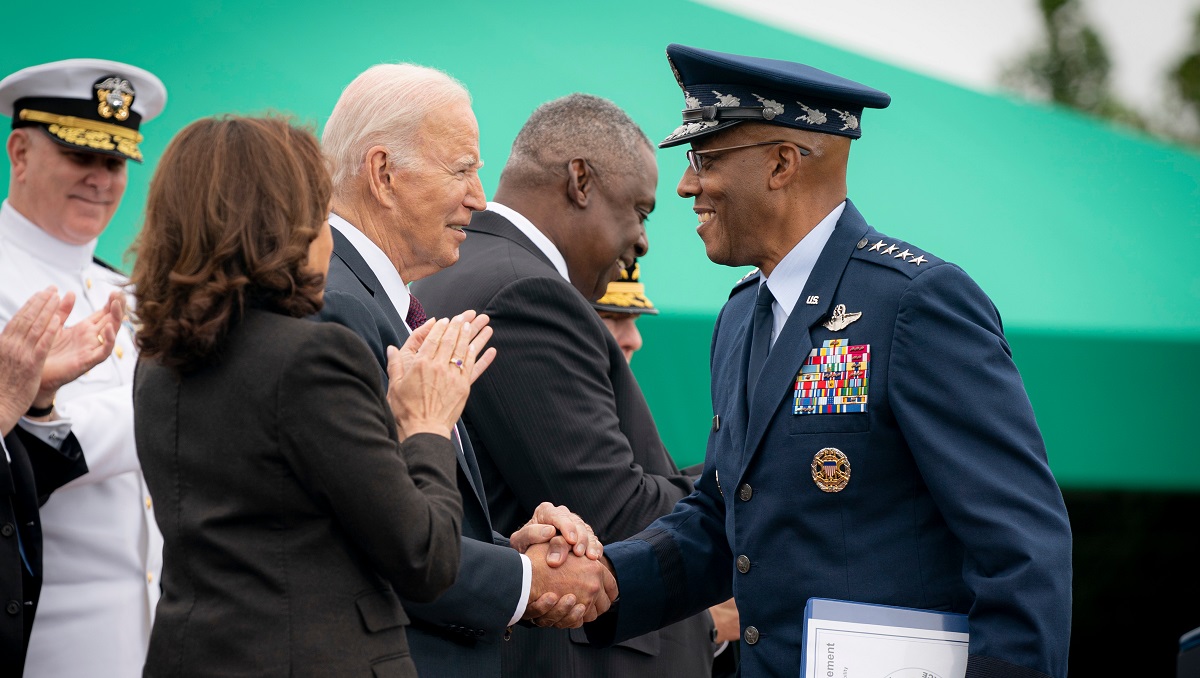
Joint. The term is used ubiquitously in the U.S. Department of Defense. Joint operations, joint professional military education, joint mindedness, joint staff, etc.—at a certain point in a professional’s career, you can’t go an hour without hearing a joint-associated term. A product of the Goldwater-Nichols Department of Defense Reorganization Act of 1986, jointness has been a much-discussed topic ever since its creation. Sharon Weiner is in the studio to present her thoughts on jointness, specifically the Joint Chiefs of Staff and civil-military relations. She joins host Carrie Lee in this first of a multi-part special series supporting the U.S. Army War College’s Civil-Military Relations Center.
Budget politics has become very volatile. And I would say that the notion that you need a budget to keep the government moving has become a secondary consideration to using the budget process to extract other gains on other political issues.
Podcast: Download
Subscribe: Apple Podcasts | Spotify | Amazon Music | Android | Pandora | iHeartRadio | Blubrry | Podchaser | Podcast Index | TuneIn | Deezer | Youtube Music | RSS | Subscribe to A Better Peace: The War Room Podcast
Sharon K. Weiner is associate professor in the School of International Service, American University, and a visiting researcher with the program on Science and Global Security, Princeton University. She is the author of Managing the Military: The Joint Chiefs of Staff and Civil-Military Relations (Columbia University Press, 2022). Besides civil-military relations, her research includes the theory, practice, and social construction of deterrence as well as crisis decision making.
Carrie A. Lee is an associate professor at the U.S. Army War College, where she serves as the chair of the Department of National Security and Strategy and director of the USAWC Center on Civil-Military Relations. She received her Ph.D. in political science from Stanford University and a B.S. from MIT.
The views expressed in this presentation are those of the speakers and do not necessarily reflect those of the U.S. Army War College, U.S. Army, or Department of Defense.
Photo Description: U.S. Air Force Gen. Charles Q. Brown, Jr. attends the Armed Forces Hail in his honor as the 21st Chairman of the Joint Chiefs of Staff at Joint Base Myer – Henderson Hall, VA., September 29, 2023. The ceremony, hosted by Secretary of Defense Lloyd J. Austin III, marked Gen. Brown’s swearing in as Chairman and was attended by President Joseph R. Biden Jr., Vice President Kamala Harris, and other distinguished guests.
Photo Credit: DOD Photo by Benjamin Applebaum





Might a review of a (possible) historic period similar to today — wherein (a) the need for revolutionary political, economic, social and value change is deemed necessary so as to provide for the national security of the United States but in which (b) these such changes are contested by those who have lost — and/or by those who will lose — power, influence, control, etc., via these such changes; might a review of a similar historic period of this kind prove useful to our discussion here? In this regard, consider the following:
“Jacksonians drew their support from Northern laborers and yeoman farmers in the South and in the West. These groups, which Jackson dubbed the ‘bone and sinew of America,’ worried that the market economy would force them into the dependent class. The Jacksonians told the farmers and the laborers that they would do everything in their power to prevent this from taking place. In essence, the men and their rank and file voting allies, along with Jackson, fought a rear-guard action against encroaching industrialization and market economy. Although they won the pivotal battles, they lost the war, because their notion of a pre-capitalist agrarian society succumbed to the industrial economy after the Civil War.” (See “The Encyclopedia of U.S. Political History” by Andrew Robertson, et al., and the section therein entitled “Jacksonian Democracy,” Page 194.)”
Today, it would seem, we live in similar “Jacksonian” times; wherein, those opposed to necessary political, economic, social and value change have (and may well again) (a) “won the pivotal battles” but (of national security necessity?) may (b) ultimately lose this such “need for revolutionary change” war.
From this such similar historical period perspective, thus, to see, for example, (a) the civil-military relations problems that everyone (to include our civil and military leaders) face in these such — transitionary — times?
Re: my thoughts immediately above:
a. While civil-military relations problems — incurred during the Jackson-to-after-the-Civil War “transitionary” period — while these such civil-military relations problems can be traced to the necessary transition from pre-capitalist agrarian economy to an industrial and market economy,
b. Civil-military relations problems — incurred during the Trump-to-after-??? “transitionary” period — can these such civil-military relations problems be linked to something like the necessary transition from an industrial and market economy to an information and global economy?
If so, then how — in this current transitionary period — with its Jacksonian-like Trump and possible civil war conflict set backs — does someone like the Chairman of the Joint Chiefs of Staff, today, do his job?
Addendum:
Dr. Weiner’s book, Managing the Military: The Joint Chiefs of Staff and Civil-Military Relations, this book is said to “explore the evolution of the institution of the JCS and illuminate the chairman’s interactions with the president and secretary of defense since the end of the Cold War” (See the American University, Washington D.C. March 2, 2023, such statement.)
Question — Based on the above:
Since the actions of the U.S./the West, after the Old Cold War and until very recently, have been significantly focused on and driven by the desire to transition — not only our own states and societies here in the U.S./the West but those of the rest of the world also; this, more along the information and global economy lines that I address above —
Given this such post-Cold War effort, does Dr. Weiner, in her referenced book above, (a) address such things as the evolution of the institution of the JCS and the chairman’s interactions with the president and secretary of defense since the end of the Cold War; these, (b) specifically from this such “transitionary goal and the common problems related thereto” perspective?
In my opinion, General Milley was too political in that he supported forcing Woke policies on our armed forces. Sharon K. Weiner mentioned Senator Tuberville but neglected to say that the Lloyd Austin memo permitting the use of DOD dollars to support travel of armed forces women or dependent women of armed forces men to travel for an abortion. This in violation of the laws of the United States of America. In testimony General Milley said he was reading Kendi to find out about racism. In fact, Critical Race Theory has six logical fallacies in it. There is a logical fallacy in the “Lived Experience” view. There is a logical fallacy in Ibrahm Kendi’s work. The logic escapes me of making public policy based on logical fallacies. We have transgendered armed forces service members which is in violation of the fact in humans sex is binary and it is immutable. We have spending requests that in no way help support our armed forces and prepare them for combat.
See,
Pentagon wants $114 million for ‘diversity, inclusion’ programs
https://americanmilitarynews.com/2023/11/pentagon-wants-114-million-for-diversity-inclusion-programs/
Critical Race Theory in Six Logical Fallacies by Douglas Groothuis
https://www.nas.org/academic-questions/35/2/critical-race-theory-in-six-logical-fallacies
The Lived Experience Fallacy by Timothy Hsiao
https://www.nas.org/academic-questions/35/2/the-lived-experience-fallacy
Kendi’s Fallacy and Its Consequences by John Staddon
https://americanmind.org/salvo/kendis-fallacy-and-its-consequences/
In Humans, Sex is Binary and Immutable by Georgi K. Marinov
https://www.nas.org/academic-questions/33/2/in-humans-sex-is-binary-and-immutable
Mixed-gender teams come up short in Marines’ infantry experiment By Hope Hodge Seck Sep 10, 2015
https://www.marinecorpstimes.com/news/your-marine-corps/2015/09/10/mixed-gender-teams-come-up-short-in-marines-infantry-experiment/
Warriors Don’t Want to Fight for a Woke, Anti-American Military By J.B. Shurk
https://www.americanthinker.com/articles/2023/03/warriors_dont_want_to_fight_for_a_woke_antiamerican_military.html
House Passed NDAA Which prohibits DOD Funds for Travel to Have an Abortion